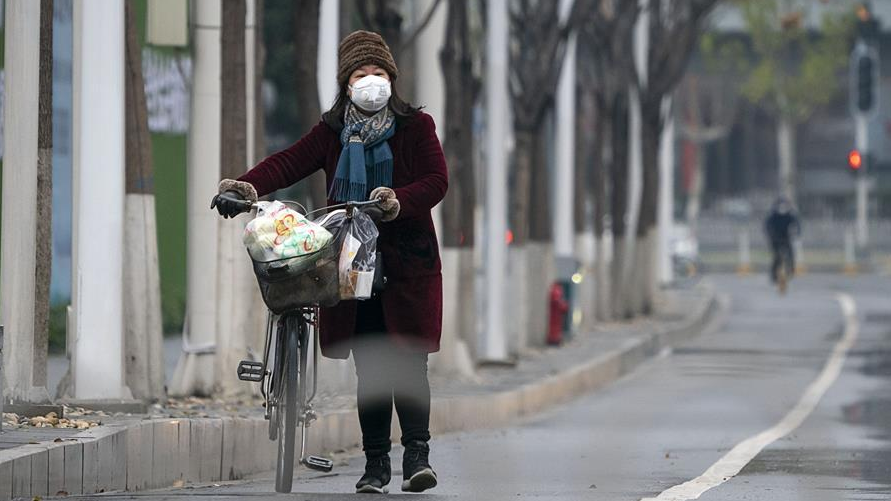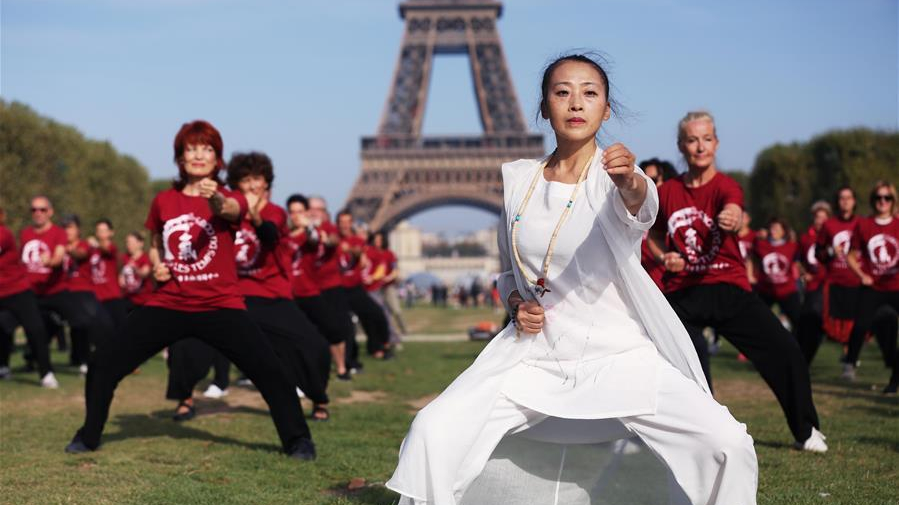
A woman wearing a mask walks along a street in Wuhan, central China's Hubei Province, January 26, 2020. /Xinhua Photo
A woman wearing a mask walks along a street in Wuhan, central China's Hubei Province, January 26, 2020. /Xinhua Photo
Editor's note: Lionel Vairon is the president of CEC Consulting company and senior researcher at the Charhar Institute of international relations and public diplomacy in Beijing. He is a former journalist (1985-1989), former diplomat (1991-2002) successively posted in Cambodia, Thailand and Iraq by the French government. He is also an author of many books and papers about China's geopolitics, international relations and Arabo-Islamic world. The article reflects the author's opinions and not necessarily the views of CGTN.
The coronavirus outbreak in China, as well as certain foreign countries, has caused various reactions. It took only a month or so before Chinese scientists finalized the study of this new virus (2019-nCoV), sequenced its DNA and raised the alert. It was reported to the World Health Organization on December 31, 2019.
The coronavirus outbreak, which has yet to be fully contained, has led to various kinds of xenophobia in certain countries, especially in my country, France, where it has had unexpected repercussions, including the rise of racism against populations of Asian descent. Recently, a hashtag – JeNeSuisPasUnVirus (IAmNotAVirus) – currently trending on Twitter has raised this sentiment to the peak. A French newspaper also deliberately used a sensational headline, a "New yellow peril?"
Over the past few days, several French citizens of Asian descent as well as Asians residing in France – including Japanese, Korean or Vietnamese people – have denounced violent and sometimes humiliating behavior toward them from French people inviting them to "return to their own country: China." Some of them have even been chased out of subway trains or had people refuse to be served by them in restaurants.
Coronavirus has become an excuse for racist behavior, which has long been kept under the radar in France and widely neglected by French authorities.
In an article published in Europe Journal on November 30, 2017, following the murder of Chinese national Zhang Chaolin in Paris, I attempted to draw attention to the attitude of media, as well as political and associative spheres, which had remained strangely silent. The constant anti-China media propaganda has certainly not helped in avoiding this growing racism toward Asians.
Other great European nations, such as Germany or the United Kingdom, have been affected by this phenomenon as well, seemingly to a lesser extent. However, the real issue is understanding how racism came to be so open.
Other than the anti-China campaign in the media, the economic and social uneasiness the French society has been experiencing is certainly one of the reasons for this growing rejection.

People practice Qigong, a traditional Chinese practice to cultivate and balance the body's inner energy, at Champs de Mars in Paris, France, September. 14, 2019. /Xinhua Photo
People practice Qigong, a traditional Chinese practice to cultivate and balance the body's inner energy, at Champs de Mars in Paris, France, September. 14, 2019. /Xinhua Photo
Asian communities in France are generally seen as successful from an economic standpoint, and their children often get good grades in school. Despite being a generalization, it remains somewhat true, and the current propaganda accusing China of trying to conquer the world, especially Europe, with its economic power and its nationals living abroad, clearly feeds this hostility.
Facing such psychosis, reason struggles to take over. In France, the flu causes thousands of casualties each year. The French Agency for Sanitary Safety has recently announced that the epidemic has spread to almost all of the country. A team of professors at the Bichat Hospital in Paris declared on January 29 in a press conference that risks of infection with the coronavirus in France were negligible. The head of emergency services added that he did not believe wearing a mask in the city was necessary, "the risk of meeting someone with the virus is very small."
Obviously, the risk of being infected by the flu virus is much greater than that of the coronavirus. In 2018, several thousand deaths were allegedly caused by this virus in France, despite being well known, and people being advised to get vaccinated every year.
Since November 2019, influenza has already caused 22 deaths in France. In the United States, since October 1, 2019, there have been more than 8.200 deaths, according to the Centers for Disease Prevention and Control. The coronavirus in China has caused more than 200 deaths so far in a country with a far greater population and during a time when the threat was yet to be contained.
The massive means adopted in China to bring this outbreak to a halt should already be slowing down the spread and quickly lead to efficient control of the virus and the manufacturing of a vaccine.
When facing the threat of an epidemic, regardless of the virus, xenophobia or even racism would only deteriorate the situation.
(If you want to contribute and have specific expertise, please contact us at opinions@cgtn.com.)